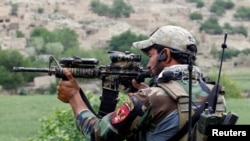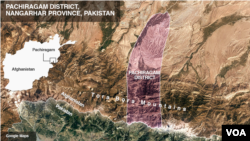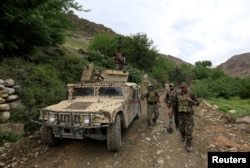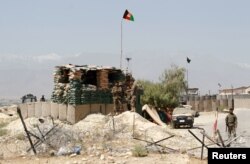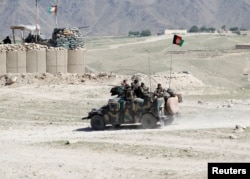In a remote district of eastern Afghanistan's Tora Bora mountains, where Osama bin Laden once took refuge, hundreds of local villagers freed from Islamic State control have been enlisted as a militia force to fight the terror group, provincial authorities said.
The Afghan National Directorate of Security (NDS) is arming dozens of local men in the Pachiragam district of Nangarhar province, which shares a border with Pakistan. The move comes after Afghan forces backed by U.S. military air attacks ousted IS fighters from the area recently.
“We have enlisted 300 local uprising members in the Pachiragam district who have been equipped and will soon start their activities,” said Attaullah Khogyani, the Nangarhar governor's spokesperson. “The National Directorate of Security will finance them and provide them weapons.”
Khogyani added that the militia, which was formed in coordination with local elders, would be deployed in the Tora Bora region to maintain security and keep IS fighters at bay.
Tora Bora
Last month, IS launched attacks on villages and Afghan Taliban positions in the region. The assault prompted local residents, who see IS militants as a serious threat to their region, to take up arms and join forces with the Taliban to push IS out.
Tora Bora, known for its complex set of mountain caves and rough terrain, was the site of a U.S. military offensive in December 2001, where now-deceased al-Qaida leader Osama bin Laden reportedly was hiding before he sneaked into neighboring Pakistan.
The ongoing Taliban insurgency in Afghanistan has stretched the security forces thin on several front lines across the country, pushing locals in Tora Bora to take matters into their own hands and defend their region in the absence of an Afghan military presence. Parts of the area also have been in the Taliban's control from time to time in recent years.
IS atrocities in the east
IS has been active in several districts in Nangarhar, as well as nearby Kunar and Nuristan provinces, repeatedly storming villages and government facilities. Hundreds of people have been killed and abducted in the attacks. The group has set homes and markets on fire, destroyed local schools and pushed thousands of local people to flee their homes in eastern Afghanistan.
IS militants also have taxed farmers in areas under their control, and have been involved in cutting down trees in some parts of the province in a timber-smuggling operation to neighboring Pakistan.
U.S. and Afghan forces continue anti-IS ground and air operations in Nangarhar's Haskamena and Achin districts, and reportedly have cleared several remote and mountainous areas of IS fighters. The forces have reached areas that had been under the control of anti-government groups for years.
Locals ask for arms
In April, the U.S. Air Force dropped a Massive Ordinance Air Bomb (MOAB), informally known as “the mother of all bombs,” on an IS stronghold in Achin, killing at least 95 IS fighters, mostly foreign nationals.
Locals in Pachiragam have vowed to fight IS if they are supplied with weapons to counter militant attacks.
“We ask the government to support us, provide us with arms and equipment. We will fight IS more effectively,” Malek Sherzai, a tribal elder in Pachiragam, told VOA.
In a similar arrangement, about 500 local men were recruited by Afghan security forces last year and deployed in several security checkpoints in Pachiragam to defend their lands against IS fighters.
VOA's Zabihullah Ghazi contributed to this report from Nangarhar.




